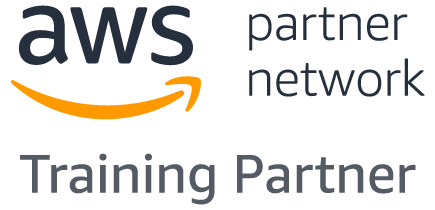Developing on AWS.
- Seminar
- Präsenz / Virtual Classroom
- 10 Termine verfügbar
- 24 Unterrichtseinheiten
- Teilnahmebescheinigung
- Online durchführbar
Sichere, zuverlässige und skalierbare Anwendungen auf AWS-Basis konzipieren und aufbauen.
Nutzen
- Set up the AWS SDK and developer credentials for Java, C#/.NET, Python, and JavaScript
- Interact with AWS services and develop solutions by using the AWS SDK
- Use AWS Identity and Access Management (IAM) for service authentication
- Use Amazon Simple Storage Service (Amazon S3) and Amazon DynamoDB as data stores
- Integrate applications and data by using AWS Lambda, Amazon API Gateway, Amazon Simple Queue Service (Amazon SQS), Amazon Simple Notification Service (Amazon SNS), and AWS Step Functions
- Use Amazon Cognito for user authentication
- Use Amazon ElastiCache to improve application scalability
- Leverage the CI/CD pipeline to deploy applications on AWS
Zielgruppe
Anforderungen
- Praktische Erfahrung mit der Entwicklung von Software
- Verständnis von Cloud Computing-Konzepten
- Gute Kenntnisse zu einer High Level Programmiersprache wie .NET (C#) oder Java
- Vorherige Erfahrung mit AWS Cloud Core Services werden empfohlen
Inhalte
Module 1: Introduction to AWS
- Introduction to the AWS Cloud
- Cloud scenarios
- Infrastructure overview
- Introduction to AWS foundation services
Module 2: Introduction to Developing on AWS
- Getting started with developing on AWS
- Introduction to developer tools
- Introduction to management tools
Module 3: Introduction to AWS Identity and Access Management
- Shared responsibility model
- Introduction to IAM
- Use authentication and authorization
Module 4: Introduction to the Lab Environment
Module 5: Developing Storage Solutions with Amazon Simple Storage Service
- Overview of AWS storage options
- Amazon S3 key concepts
- Best practices
- Troubleshooting
- Scenario: Building a complete application
Module 6: Developing Flexible NoSQL Solutions with Amazon DynamoDB
- Introduction to AWS database options
- Introduction to Amazon DynamoDB
- Developing with DynamoDB
- Best practices
- Troubleshooting
- Scenario: Building an end-to-end app
Module 7: Developing Event-Driven Solutions with AWS Lambda
- What is serverless computing?
- Introduction to AWS Lambda
- Key concepts
- How Lambda works
- Use cases
- Best practices
- Scenario: Build an end-to-end app
Module 8: Developing Solutions with Amazon API Gateway
- Introduction to Amazon API Gateway
- Developing with API Gateway
- Best practices
- Introduction to AWS Serverless Application Model
- Scenario: Building an end-to-end app
Module 9: Developing Solutions with AWS Step Functions
- Understanding the need for Step Functions
- Introduction to AWS Step Functions
- Use cases
Module 10: Developing Solutions with Amazon Simple Queue Service and Amazon Simple Notification Service
- Why use a queueing service?
- Developing with Amazon Simple Queue Service
- Developing with Amazon Simple Notification Service
- Developing with Amazon MQ
Module 11: Caching Information with Amazon ElastiCache
- Caching overview
- Caching with Amazon ElastiCache
- Caching strategies
Module 12: Developing Secure Applications
- Securing your applications
- Authenticating your applications to AWS
- Authenticating your customers
- Scenario: Building an end-to-end app
Module 13: Deploying Applications
- Introduction to DevOps
- Introduction to deployment and testing strategies
- Deploying applications with AWS Elastic Beanstalk
- Scenario: Building an end-to-end app
Module 14: Course wrap-up


